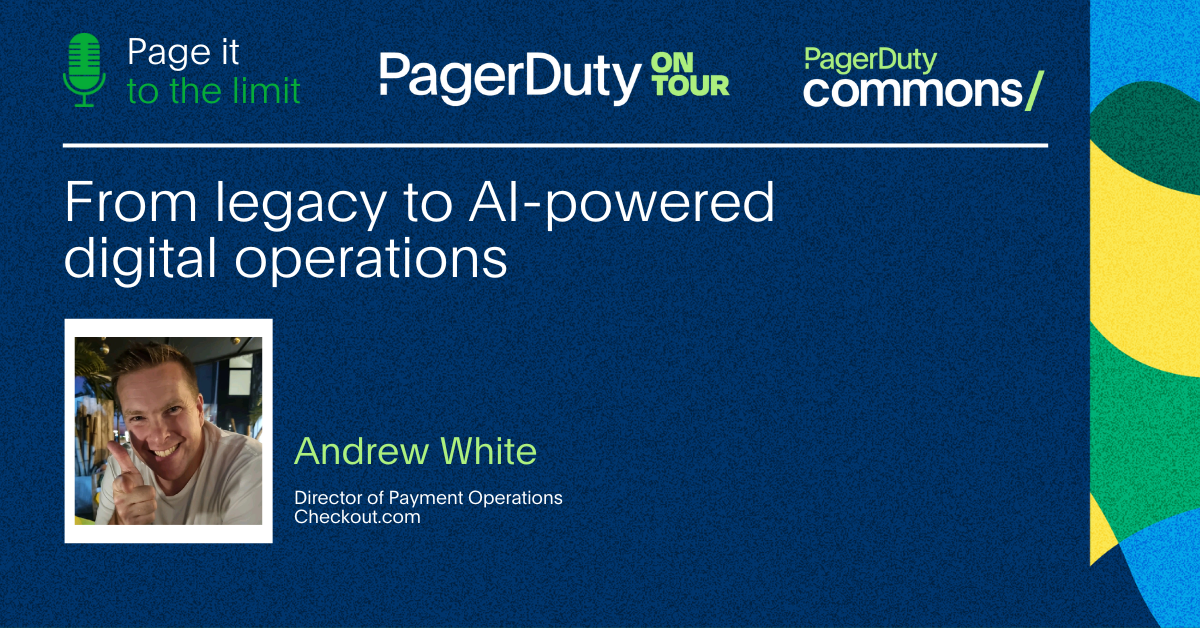From Legacy to AI-Powered Digital Operations With Andrew White
Posted on Tuesday, Apr 1, 2025
Transcript
Daniel Afonso (00:09): Welcome to Page It to the Limit, a podcast where we explore what it takes to run software and production successfully. We cover leading practices using software and industry to improve both systems, reliability and the lives of people supporting those systems. I’m your host Daniel Afonso, and you can find me on X, LinkedIn and Bluesky at danieljcafonso. This episode was recorded at PagerDuty [00:00:30] on Tour London. If you’re listening to it before April 2nd, 2025, you can still join PD On Tour in person. Here are the upcoming dates, Sydney on April 2nd, Tokyo on April 10th and San Francisco on April 15th. To register, just head to pagerduty.com/on-tour and pick your favorite location. I’m looking forward to seeing you there Now onto the episode.. Hello. Hello everyone and welcome back to [00:01:00] one more Page it to the limit episode, a special one again for PD on Ttour in London. And you guessed it. I have again, one of our amazing speakers here. We’ll be do a really exciting session that I can’t wait to see. So I’m going to let him introduce himself. So tell us about you.
Andrew White (01:17): Thanks Daniel. My name is Andy White. I work for Checkout.com and I’m the director of technology Operations there. Okay, and what are some things you’re currently passionate about? Probably [00:01:30] computer games. Love that big part of, a big part of what I enjoy to do. DIY in my house at the moment, big project going on there. And also strange as it might seem, I’m really passionate about incident management and being as good as we possibly can delivering service to our merchants. Just a curiosity, what’s the current game you’re really excited about? I’m still playing Baldur’s gate 3, [00:02:00] but I would probably say GTA VI maybe. That one’s a pretty good one. And still playing with my son on Sunday evenings. Helldivers too. So big fan, big fan.
Daniel Afonso (02:09): Okay. So many cool games there. Yeah, we could just shift the podcast now to start talking about that. Myself personally, I have been addicted to this game called Balatro.
Andrew White (02:19): I’ve got it on my phone.
Daniel Afonso (02:20): Yeah, love that. I’ve traveling. So let’s stop talking about balatro and gaming because that might be exciting for some of you, but that’s not what we are talking [00:02:30] here to talk about. So we’re here at PagerDuty on Tour in London and you’re going to be doing a session. Can you tell us a bit more about your session?
Andrew White (02:38): Yeah, so I’m here to talk to Nora about AI powered digital operations and how Checkout has used PagerDuty to transform our conventional kind of standard old fashioned if you like, operations into that kind of AI driven technology driven of [00:03:00] fast paced operations that we’ve got at the moment, and particularly how we’ve used PagerDuty to help us out with some of the regulation that is specific to our industry like Dora for example.
Daniel Afonso (03:11): Okay, yeah, that’s really exciting. So for anyone that’s listening, if you’ve listen the previous episode now, the drill, you can go in the transcripts and check the links for the recording, which should be coming up out anytime soon. So you can check Andy’s talk there. So Andy, in your talk you are going to be discussing [00:03:30] legacy operations and modern operations. So say’s the difference between them and what do modern operations look like?
Andrew White (03:39): I think it’s pace and scale as much as anything. And for us particularly at checkout, when we started out with that traditional operations approach, we kind of just threw people at it to start with and I think maybe that’s when you’re getting started, maybe that’s what you do and then you realize at a certain point that [00:04:00] it’s not going to scale and you need to really consider how you make it scale, how you are more efficient, how you can drive down cost while like increasing customer satisfaction and so on. So I think the difference really is the pace and the scale for me and how much more you can do with that digital driven approach than you can with traditional people. I think there’s always going to be a human interaction there. You’re always going to need some smart people looking at stuff, particularly building stuff [00:04:30] and driving stuff around incident. But having that ai, having that technology backbone to it with a partner like PagerDuty is really key.
Daniel Afonso (04:42): Okay. And do you feel like AI had any impact on this transformation into more modern operations?
Andrew White (04:49): Yeah, absolutely. I think honestly when we first started out on this journey with PagerDuty four years ago, AI really wasn’t in the picture, not particularly the [00:05:00] pace that AI is changing things is insane. In all of my 25 year career, I’ve seen a lot of things change, but I’ve never seen anything move at the pace of this. We are literally looking at stuff changing month to month, literally something that wasn’t possible in December is possible now. I mean the pace of it is insane. So absolutely ai particularly things like AIOps with PagerDuty has helped us to reduce a lot of the noise and a lot of the churn that we see. So [00:05:30] whereas before we would really focus hard on trying to cut down what we pushed into the system, we can use AI to strip a lot of that out and actually look for patterns that we might’ve missed if we’d have excluded some of that stuff.
Daniel Afonso (05:44): Well that’s really exciting. And follow up here on this part as well, still on the legacy versus modern operations. So when this happens then it tends to weave to lead to some cultural changes. How do you balance these changes [00:06:00] that follow a transition from a legacy to modern operations?
Andrew White (06:02): Yeah, I think it’s a great question Daniel. I think people are very nervous to remove people from processes and I don’t think this is necessarily about removing people. This is about augmenting people, giving them ability to do more with what we’ve already got. Continuing as we hyperscale a business like checkout that is continuing to grow really, really strongly looking at how we flatten the cost while [00:06:30] growing, while continuing to grow strongly. So it’s not about taking people out, it’s about doing more with what you’ve got. And I think we definitely see concerns, I definitely see concerns there with taking people out, but I don’t think people need to worry, particularly at checkout. We’re looking to do more with this rather than cut people out. So that’s the first thing is it’s not going to take your job.
(06:59): I think the saying is [00:07:00] AI is not going to take your job. Someone using AI will take your job. So it’s augmenting our people to do that. So I think also people are quite wed to processes that have worked for a long time and done well for a long time. So particularly people that have developed things that do a perfectly fine job, they struggle to move away from them. Sometimes it’s almost like little bit of a loss of control or maybe passing things over to [00:07:30] do with digital systems that they would’ve done themselves is a little bit scary at times. I think the way that we address those, particularly at checkout was to demonstrate, make small steps towards, hey, this is what we can do and this is what we can help you to do if we make small steps towards automating some of this stuff or pushing this towards PagerDuty. So I think it is about building trust as you go and building small successes to build on so that you can then go and sell it. So definitely there’s that culture [00:08:00] shift there from an individual or small team of people doing stuff to how they can contribute to the wider initiative that we’re pushing.
Daniel Afonso (08:12): Okay, yeah, those are really great points and I believe you’re going to be talking a bit more about this also in your session, so just to follow up for people again to go watch it. So now I want to take some more light questions and a bit more fun. If you have been listening to these previous episodes, you’re on PD on tour, you’ve seen [00:08:30] this question show up in different points. So now let’s see a new one. So how would you explain AI to a five-year-old?
Andrew White (08:38): Yeah, wow. Got to keep it super simple, right? So I think I’d say something like it’s computers doing the boring stuff for people.
Daniel Afonso (08:47): Oh, that’s a really good one. I think from a five year perspective they’re like, oh, okay, I get it.
(08:53): And I love that how you summed it up in one sentence because it’s very, when you get these type of questions, it’s very easy [00:09:00] to just go on and go on and go on and I think you just did it with the sentence and I think this wouldn’t be one answer that a five-year-old will go, oh, but why? So thanks for that. You’re welcome. Still on the AI topic now we’re seeing AI being integrated everywhere in operations and I want to ask you two questions. First of all is what’s one task you would never trust to AI and what is one task that you [00:09:30] cannot wait to end over to ai?
Andrew White (09:32): So I think driving actually is, I know there’s a huge amount of possibility there and we will definitely see
(09:41): Ai, automated cars and taxi and so on that’s coming. The reality is here. So there’s that. But I love driving and I probably wouldn’t want to do that. I can see how it can reduce traffic jams and it can decrease fuel usage and all this kind of stuff. Absolutely love it. But I like to drive [00:10:00] and I’d always want to do that. So maybe there’s a case. Maybe if I’ve had a drink and I need to get an car, fine, maybe I’ll accept it then. But otherwise I want to be able to drive myself and something that I think will be AI controversially, I guess. I think flying airplanes weirdly is going to surprise people. So I think actually having a pilot at the front of an airplane will be something that’s a bit strange in a few years, maybe 30, 40, 50 years maybe it’s a long way [00:10:30] out. But I can see pilots overseeing what were pilots overseeing the operation of five, six airplanes that are flying all at once from a remote location. So
Daniel Afonso (10:42): That’s interesting.
Andrew White (10:43): Interesting prediction. Yeah, it’s a controversial one because people, I think culturally, people from that safety point of view, they want a human in charge of things because computers make mistakes, but hey, guess what? People make mistakes too.
Daniel Afonso (10:54): Everyone makes mistakes. Exactly. But that’s a very good prediction. Let’s in a couple of years try to come [00:11:00] back to this episode and see if you are right or not. Yeah,
Andrew White (11:02): Absolutely. I’d love to.
Daniel Afonso (11:04): Okay, so to wrap up and so we can free to you to go get ready for your session. What is the one thing you are currently excited about and are looking forward to exploring for the rest of this year?
Andrew White (11:15): Yeah, I think it’s going to be how AI agents are going to be able to own the incident detection, mitigation resolution, communication piece end to end.
(11:27): So that’s going to be super interesting. The idea [00:11:30] that an AI agent can pick up from the start all the way through and manage and assist people all the way through the resolution and out the other side. I think that’s going to be super interesting. So that’s just one of the things I’m keen to see. But agent AI is going to transform the business this year. I’ve never seen so many valid use cases for a technology and these aren’t moonshots. These are cases where they’re likely to get funding and we’re likely to move ahead with ‘em.
Daniel Afonso (12:00): [00:12:00] Well those are very great answers. Thank you so much. So Andy, where can people find you if they want to connect with you?
Andrew White (12:08): I’m on LinkedIn, look me up Andy White at Checkout.com. I think that’s probably the best place
Daniel Afonso (12:13): There. We also going to paste the link here on the podcast so people should also be able to check. So Andy, thank you so much for joining me here. I hope you have a very good session. Like I mentioned, everyone, feel free to go watch the recording, which is going to be available for everyone and [00:12:30] as you know it, have an uneventful day and I’ll see you next time. Bye. That does it for another episode of Page It to the Limit. We would like to thank our sponsor, PagerDuty for making this podcast possible. Remember to subscribe to this podcast on your favorite streaming service. If you like what you’ve heard, you can find our show notes at pageittothelimit.com and let’s continue this conversation on PagerDuty Commons at community.pagerduty.com. [00:13:00] Thank you so much for joining us and remember, an eventful days are beautiful days.
Show Notes
Additional Resources
- Watch Andrew session at PagerDuty on Tour
- PagerDuty On Tour
- PagerDuty Home Page
- PagerDuty Commons
- Checkout.com
- Episode edited by Mandy Moore
- Transcripts by Rev
Guests

Andrew White
Andrew always had a passion for technology and, age 8 in the mid 80’s, he was lucky enough to receive (after much pestering) an Acorn Electron as a Christmas gift. Back then, hacking at BASIC, reverse engineering code and playing games, his imagination had to fill in for the absence of advanced graphics, sounds and immersive narratives. Nowadays with ever advancing technology multiplied by the power of collaboration, if we can imagine it, we can bring it to life. He has never found this more true than in his roles at Checkout.com. He has been immensely proud to be a part of Checkout’s journey so far, together with an exceptional team, they really are reshaping the future of payments.
His career has been dedicated to delving into the intricacies of technology, finding innovative solutions, and leading and motivating teams to excel in high-pressure, critical transaction processing environments. He thrives on understanding the details and intricacies of complex systems, using technology as a tool to drive efficiency and excellence. I’m an experienced and driven IT executive with a broad range of experience in global service operations management with technology, media and financial services organisations over a 25 year career.
Hosts

Daniel Afonso (he/him)
Daniel Afonso is a Senior Developer Advocate at PagerDuty, SolidJS DX team member, Instructor at Egghead.io, and Author of State Management with React Query. Daniel has a full-stack background, having worked with different languages and frameworks on various projects from IoT to Fraud Detection. He is passionate about learning and teaching and has spoken at multiple conferences around the world about topics he loves. In his free time, when he’s not learning new technologies or writing about them, he’s probably reading comics or watching superhero movies and shows.